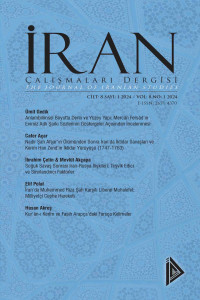Abstract
In contemporary academic studies concerning post-revolutionary Iran, scholarly attention predominantly gravitates towards dissecting aspects such as foreign policy strategies, military endeavors, the intricacies of the nuclear program, and the socio-political dynamics. However, there exists a notable oversight regarding the comprehensive examination of the institutional framework that underpins the Islamic Republic. Hence there is a significant need to delve deeper into the state-bureaucratic attributes of the nation to gain a more holistic understanding of its governance mechanisms.
Keywords
Abstract
In contemporary academic studies concerning post-revolutionary Iran, scholarly attention predominantly gravitates towards dissecting aspects such as foreign policy strategies, military endeavors, the intricacies of the nuclear program, and the socio-political dynamics. However, there exists a notable oversight regarding the comprehensive examination of the institutional framework that underpins the Islamic Republic. Hence there is a significant need to delve deeper into the state-bureaucratic attributes of the nation to gain a more holistic understanding of its governance mechanisms.
Keywords
Details
| Primary Language | English |
|---|---|
| Subjects | Regional Studies, Middle East Studies, International Relations (Other), Contemporary History of Iran |
| Journal Section | Kitap Değerlendirmeleri |
| Authors | |
| Early Pub Date | June 29, 2024 |
| Publication Date | June 30, 2024 |
| Submission Date | May 16, 2024 |
| Acceptance Date | May 31, 2024 |
| Published in Issue | Year 2024 Volume: 8 Issue: 1 |
Creative Commons License
This work is licensed under a Creative Commons Attribution-NonCommercial 4.0 (CC BY NC) International License.
The Journal of Iranian Studies accepts the Open Access Journal Policy for expanding and flourishing of knowledge.


